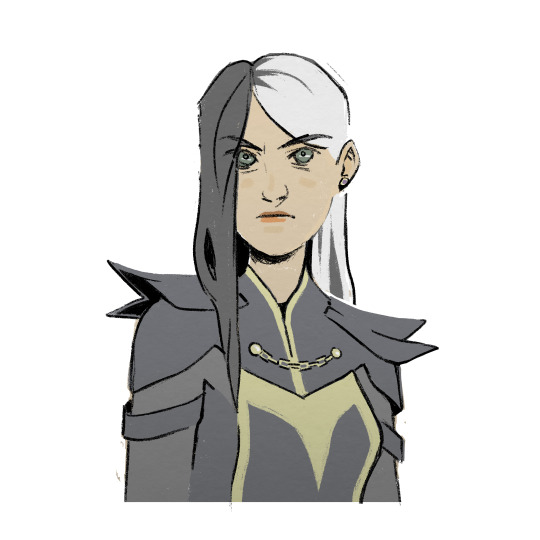Text
the rituals WERE intricate but they were also fucking
723 notes
·
View notes
Text
.
Why is aaravos fucking a dragon 100% giving me life
8 notes
·
View notes
Text
this one's for the monsterfuckers
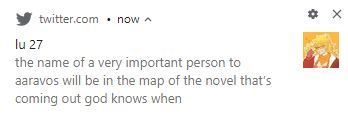
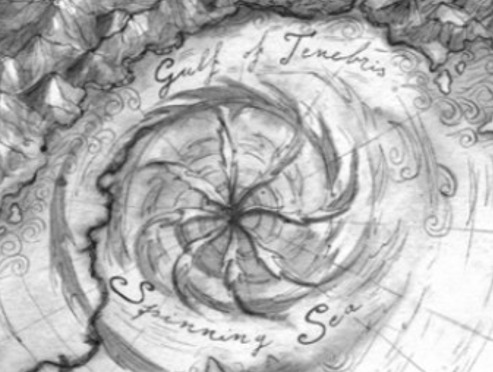

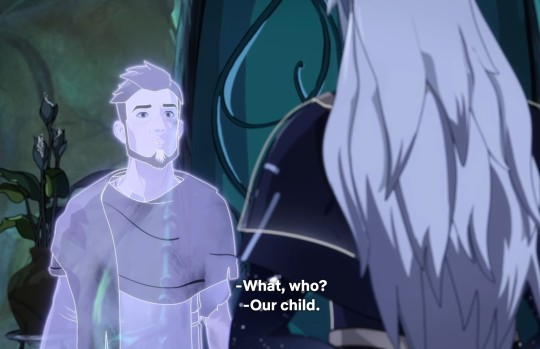

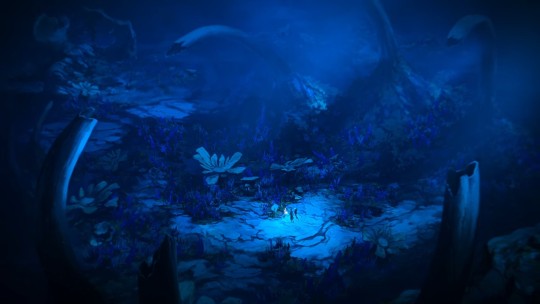
do you see my vision
19 notes
·
View notes
Text
The moment when Ziard strikes the staff into the ground right before he’s obliterated by Sol Regem’s fire is metal as hell, fearless as fuck, we stan a dark magic KING.
13 notes
·
View notes
Text
what was Aaravos doing during S5?
guess you could say he was finding himself
#and on the way he found VIREN…CALLUM…CLAUDIA….and Pharos#one of them mormons u kno#he had it coming he had it coming he only had himself to blame etc etc
59 notes
·
View notes
Text
Gift Giving & Primal vs First Elves :: Or Going Off Into the Deep Lore Deep End
Remember that meta I compiled about Greek mythology, deceptive gift giving, and TDP? Yeah it's time to talk about the gift motif properly as well as some other deep lore things because these excellent thoughts ( @spicyviren, @kradogsrats, and @its-leethee) got the wheels in my brain spinning.
AKA an unknown amount of sectioned word vomit into the nature of magic, where it comes from, how deep magic operates, some gifts and motifs, and Leola, just a little.
Let's go.
Gift Motif
The gift motif is one that's a bit of a slowburn in TDP. While characters will often pass and hand over objects — tools, artefacts, metaphorical responsibilities or trust (handing over the egg, for example) — to one another, there's not a big emphasis on gifts in the first three seasons.
There are some, such as Callum's letter from Harrow (that he's given by Claudia once again initially as a goodbye), Ezran giving Bait to Barius in S3, and Rayla's family pendant, but most of these, as you've might already noticed, are contextualized within Goodbyes. Whether the gift motif will amount in arc 2 to escaping this "final gift" context remains to be seen, but that's how it tends to work in interpersonal relationships.
There is an element of peace offering in hoping that returning Zym — a gift and/or gesture of good will — will help usher in peace, but I think (as of now at least) that ties further into the series' theme of Reciprocal Exchange (the assassin mission being an eye for an eye vs olive branch for olive branch) than outright gift giving. (Although we will probably talk about Exchange and gift giving at some point because there is also a thematic tether there.)
However, there is one other thing that is more and more often referred to as a gift in Arc 1, and that's Magic. Specifically, dark magic.
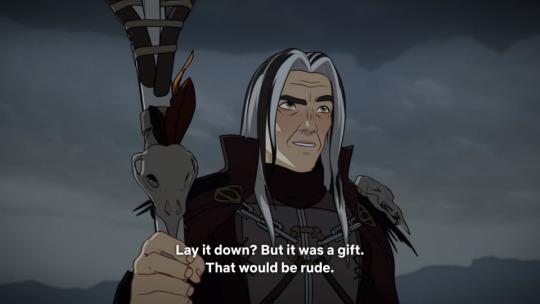
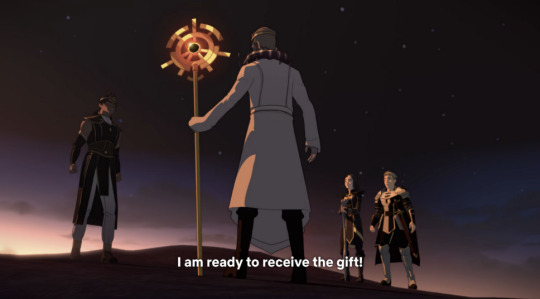
Now, this actually isn't that dissimilar from what the Goodbye gifts amount to, either. In Harrow's letter, he gifts Callum the Key of Aaravos believing it to be a powerful magical relic of some kind; Rayla's pendant makes its way from Ethari to her to Callum, who then uses it for magical purposes; and Bait, as a glow toad, is connected to an arcanum himself.
I do think it's noteworthy though that in Arc 1, (dark) magic being a gift is emphasized upon, specifically because of these lines for Khessa:
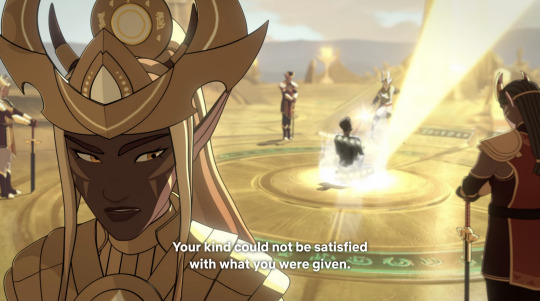
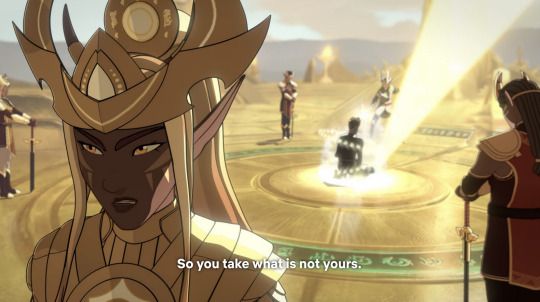
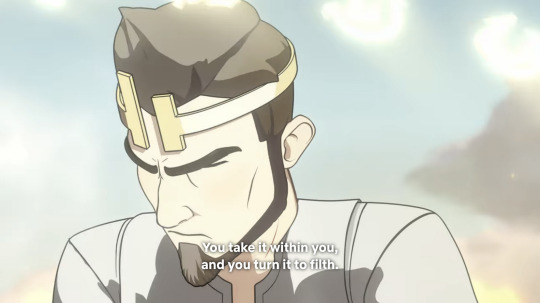
Upon first watching it back in 2019, it made sense that dark magic would be referred to this way, even when I just thought maybe it was that humans had been given 'nothing,' as Claudia says. Dark magic is closely tied to ideas of theft and thievery — stealing magic from others to harness its power for yourself — and the series is deeply interested in concepts of ownership or who has 'true' ownership over something, in magic, a throne/crown, a price to pay, etc. This follows neatly into Arc 2 (for ex: why Karim seeking to steal the Sun Seed is a metaphorical dark path even if it didn't outright involve dark magic through Kim'Dael), which we'll build on later.
That said, given the depth of the knowledge at the Great Bookery that is open to Sunfire elves more than any other type of elf, and the information that Tales of Xadia and Ripples gives us...
While elves warned that if humans were meant to wield magic they would have been born with it, [Leola] gifted the wisest humans with secrets: the language of the dragons and the runes that shaped spells. With the unicorn’s gift, the most determined minds among the humans could finally harness primal magic.
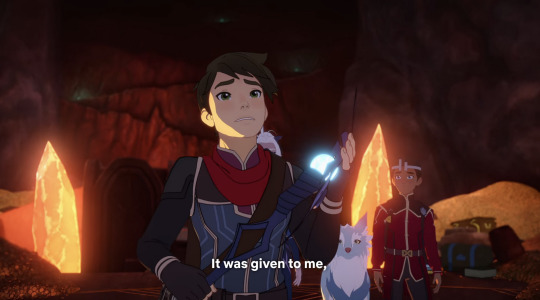
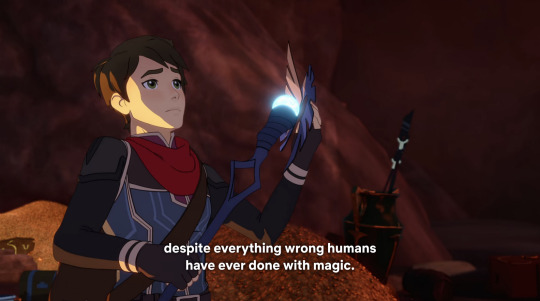
It happened long ago, when humans had only just learned to hold fire in their hands without burning. They nurtured their precious primal flames secretly—in the dark of night, beneath shadows and shrouds—as cultivating its glow drew the eyes and ire of monsters [...] Humanity had been given something it was never meant to have. And so there came a calamity.
It makes it more than likely than, unlike other elves such as Lujanne or Ibis, Khessa had reason to believe/know that there used to be primal human mages in the past... and that it wasn't 'enough' for them ultimately, because they still hungered and developed (and were given?) dark magic. "Your kind could not be satisfied with what you were given" was about the rejection of primal magic from Leola (the unicorns) in favour of a darker kind that involves theft and "dirtying yourself" (5x08) with dark magic.
But at the same time, this complicates the Gift Giving motif of including not just dark magic, but being also for primal magic — for humans, at least.
And also for elves. (Ignoring how "great orb" is very similar to "great one" for now.)
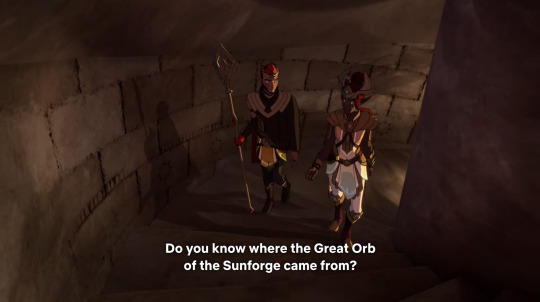
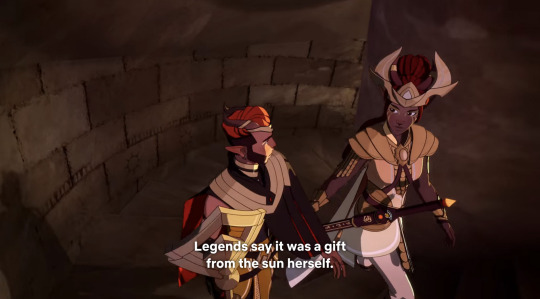
Janai: It was a gift. But there's more to it than that. The great orb began as this.
Karim: This is... a sun seed?
Now, the Great Orb being grown from a Sun 'literal' seed makes sense. We've known for a long time that in Xadia, "magic is everywhere. It's just part of the vibrance or spirit of things" (1x05). Primal magic naturally occurring in plants, animals, and elves likewise makes sense on that note. Just as not "many could bear the gruelling path of a rune mage," Karim cannot bear to have patience and faith in something that will only come to fruition centuries later.
That said, I raise the question: how functionally different is the Great Orb from say, a sun primal stone would hypothetically be? If primal stones and primal magic were gifts to humanity from unicorns — from creatures connected to the Star arcanum, for lack of a better understanding — then why not magic from Startouch (?) elves to other elves.
How do we know that all magic isn't simply a gift that was given once upon a time?
From the First Elves to the Primal Elves.
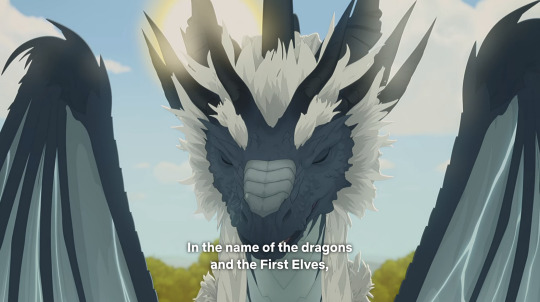
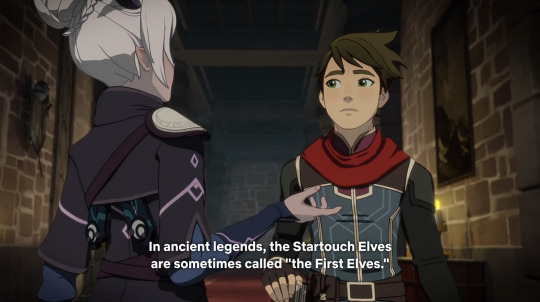
Primal vs First Elves
So what's the difference between First Elves and Primal elves?
Well we have a few pieces of lore:
1) Zubeia's status as a "heavenly majesty" (which we'll come back to in the next section) gives her authority to speak in the name of the first elves, who are effectively gods to humankind and/or Xadians ("Have our Gods died? / Where do the fabled Great Ones hide?" —the Epic of the Void
2) It seems that the First Elves are, as of now and for a while, exclusively in reference to what would otherwise be called Startouch elves, although the latter is seemingly a name that came later given Rayla's affirmation of "ancient legends". This is reaffirmed in Tales of Xadia's two lone mention of First Elves:
No group of elves presents a greater mystery than the Startouch elves. Sometimes called the First Elves, those bound to the Star primal are rumored to have made great marks on Xadia’s ancient history—but beyond story and legend, little real evidence is left to us today [...] Among the few extant records of Startouch elves are the Scrolls of the First Elves, now kept in the Great Bookery of Lux Aurea.
3) At a post-S2 con in 2019 (how's that for a far reach?) we got a timeline of the events of Xadia laid out for us. The description of the very first piece of history and era we know of goes as follows, with the Rise of Elarion happening 2000 years ago re: the Dragon Prince era ("The Return of Aaravos"):
The Era of the First elves is the first recorded era 5,000 years prior to the current era. Dragons and elves were not allied during this period. There were no distinct primal elves. This is an era before all that. Humans suffered during this period.
—2019 con timeline
4) Justin and Aaron reaffirm this at the 2:30 ish minute mark of this video (a couple of months before even S3 was released) by reaffirming distinctly to Primal elves. Later (7:40-ish mark) we see this distinction reaffirmed again through the statement of, "The patterns have been that these primal based elves have grown cultures and civilizations that have become separate and differentiated from kind of whatever the early days were with the First elves were."
Okay, so there was 100% a time where there were only First Elves, and humans, and Primal elves as we knew them (maybe still with the hands and horns, but no arcanum? Or no singular, distinct arcanum) didn't exist. Why does this matter?
This is where the deep lore timeline gets tricky, as we don't know precisely when 1) humans received magic and 2) at what stage the First Elves / Great Ones / Startouch elves 'left' Xadia, only that they did, apparently, when Elarion (the human city) needed help: "Elarion, unworthy whelp / Wept as the stars turned black the sky / They donned their masks / They turned their backs / And left Elarion to die". Why abandon the city (beyond indifference/cruelty as Aaravos would likely claim), who knows.
However, we can assume the timeline looks something like this:
Era of the First Elves
Primal elves (and presumably archdragons *) are crafted / develop into being, whatever that means
Humans are magic-less and are having a bad time
Unicorns / Leola extend sympathy despite the fact that the First Elves tell her not to (Book One: Novelization / Tales of Xadia)
Humans have primal magic (Ripples / Tales of Xadia)
This attracts negative attention, consolidated in Elarion ("the stars she asked their light to cast / and stop the dragons’ fiery might" / "as cultivating its glow drew the eyes and ire of monsters. Eventually, for the audacity of their fire, they were hunted")
Elarion asks for help and the Stars leave
Aaravos, the last star — presumably already Fallen from the First Elves — gives them dark magic under the guise of protection even though it will inevitably help him (i.e. give him the ability to possess people)
Dark magic replaces primal magic as the primary form for humans
Tension and violence escalates (unicorns are hunted to near extinction). Sol Regem is removed as King of the Dragons
Under Dragon Queen Luna Tenebris, the daughter of an elven leader suggests the Judgement of the Half-Moon, causing for humans to be banished rather than eradicated, and the continent split in two
Again, nothing too crazy / not too much we haven't already known or guessed at for a while.
But like I said, I'm gonna propose two theories, so bear with me:
Theory #1: What is Deep Magic?
The First Elves engaged with what we're gonna call Deep or Old Magic, for lack of a better term. There can be an assumption at times that this magic would be more 'pure' or less 'diluted' than dark magic or even the primal magic we've seen on screen. However, I think that's less than likely. Dark magic is often times a bad path for good outcomes, and primal magic can be a 'good' magic for bad outcomes (the blood freezing spell, for example).
While dark magic is a more textually malevolent magic system and primal magic is more true neutral — able to be used as a tool and a source of connection for the user — I don't think this necessarily means that Deep Magic is inherently enlightening (we see with the Ocean arcanum and S5 that knowledge can be an immense burden) or that it's on the opposite end of the spectrum and is outright benevolent.
What, then, am I suggesting Deep Magic to be? Well, we have some clues likewise from the same old interview post-s2 that we haven't had much basis to (potentially) understand until now, in which it's stated:
Deeper magic and deeper gifts that the original beings received [...] practical, usable, powerful magic is drawn from the six primal sources, right? But there is this idea that there's this earlier, less differentiated power kind of magic that's deeper and more - I don't kind of want to say what all of them are. It's not that important now, it has more to do with the history of beings and their interactions with each other. But Aaravos cares about some of this stuff. The best I can say is that one of them's Power — but well, what does that mean?
The six primal sources — potentially just five (hence why only 5 gemstones seem to occur naturally in nature, and Star seemingly doesn't) — are all based around physical, somewhat tangible principles. Earth, Ocean, Sun (fire/light), Sky (wind/weather) are perhaps the most tangible, with only Moon dipping into something into something more metaphysical: illusions and questioning the nature of reality, the nature of death, etc. However, I'd argue that the Moon arcanum's emphasis on death still makes it something that is particularly important to creatures who are mortal (but more on that later).
What I am arguing for is then, therefore, that Deep Magic is magic drawn from Concepts and Ideas > tangible things found in nature or parts of other magical creatures.
Three concepts, to be exact: (translated dark magic screenshot from Cartoon Universe spells reversed).
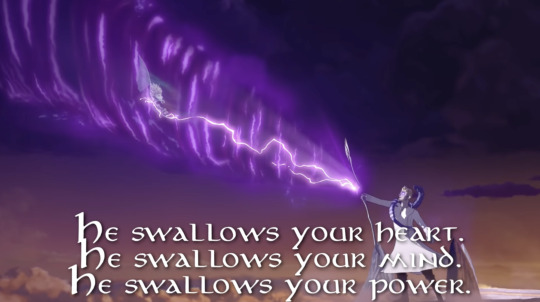
Zubeia: He chose as his instruments those who had strong hearts and strong minds, but who had an insatiable thirst and fascination with magic (power).
Three quasar diamonds, three deep magic concepts. Heart, Mind, Power.
("To know something truly and deeply, you must know it with your head, hand, and heart. Mind, body, and spirit." / "She laid before me her scales, her blindfold, and her sword, and told me to choose.")
Now, I don't know if it's these three concepts exactly — I could Truth, or Justice, or something like that — or even if it's three. But given what little we know about Deep magic thus far and how much the series' likes its threes, I think that's the likeliest number and combination.
We've known for a while that there's something weird with the connection between dark magic, spells that use blood, and 'star' magic. We know it's unlikely that Aaravos being able to possess people who have used dark magic was just a happy accident discovered after humans started using it. We know that when Callum is offered the dark magic version of the cube in his dreams, the symbol is blood red: "You can have unlimited power." And that dark magic "became the key that unlocked a place of power for humans in Xadia" (Tales of Xadia).
So what if dark magic stems from the vein of Deep magic that's taken from the concept of Power? What if when Aaravos offered his pawns "unlimited" Power, or when Kpp'Ar accused Viren of (potentially using star magic) "making the same choice you always made: the one that gives you Power," they meant it?
Alternatively, this could mean that most other Startouch elves — their longevity, their indifference — comes from the vein of Mind and subsequent intellectual detachment? Enough intelligence and reason not to hunger for more (Power), but not enough compassion and empathy to sympathize with others (Heart).
And it would also tie into Leola being unique among her own kind for her heart taking pity on the humans, and giving them primal magic — perhaps in the vein of Heart, if we're keeping things consistent — and why love ("To know something truly and deeply [...] I love you with all of myself, and I always will" / "To love is simply to know this: the tides are true as the ocean is deep") has been consistently tied to Callum unlocking arcanums. The "Narrative of Strength (power)" vs "Narrative of Love" being even more literal than we thought.
This wouldn't be too out of line since Moon arcanum philosophy already borrows heavily from Plato's idea of the forms/reality (Plato's allegory of the cave, anyone?) and the forms basically mean "your imagined ideal of the object in your mind is going to be more perfect than any tangible, 'real' version of the object could ever be." That being applied to living beings who are literally in the sky would track a certain amount, in addition to the idea that however primal magic is set up in Xadia right is "the whole world is like a giant primal stone; sky magic is all around us, and it's also in me, with every breath we take." But I digress.
With the distinction of Deep Magic as 1) separate and a sea that flows into the primal as well as 2) older and earlier than primal magic, now onto the next theory:
Theory #2: First elves and the Archdragons?
Now admittedly this one is more speculative since beyond knowing 1) the First elves = what we'd call Startouch elves, 2) the rest of them except Aaravos 'left' Xadia a while ago, and 3) the aforementioned possible 'Mind' deep magic thing, we very quickly run out of set knowledge into full blown speculation. Beyond
With that in mind, I wanna talk about the... weirdness, I suppose, between the Archdragons / draconic royal family and the First Elves.
There's a few notes to this: we know that Ancient Draconic is the language of primal magic, indicating that dragons existed and presumably had primal magic before elves did, and that elves had to be given that linguistic knowledge at least to a certain degree.
Then we also have the way Zubeia is referred to being mirrored with the way she describes Aaravos later:
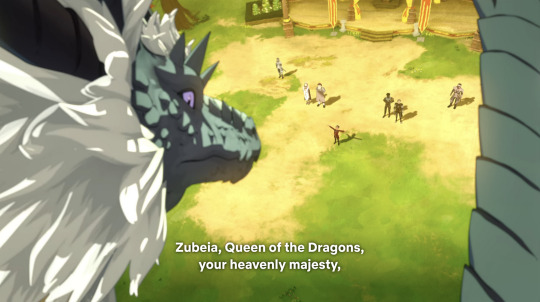
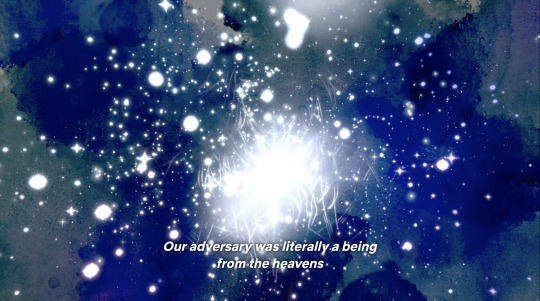
Likewise, the one person/creature we've seen referred to as a god outside the Epic of the Void poem is Avizandum by Harrow (bonus points for the game motif of "entire armies have fallen like toys" because of him):
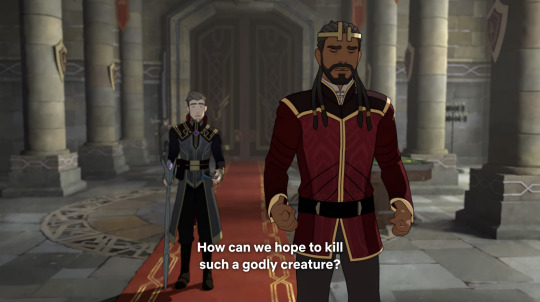
Bloodmoon Huntress also asserts that from an elven point of view (or at least Lain and Tiadrin, and presumably Runaan, too) that "Dragons are the lifeblood, the very core of Xadia" and generally assumed that dragons have the most powerful connection to their individual primal sources.
So I'd be willing to wager (esp since Sol Regem is at least 1,2000+ years old) that Archdragons at least once upon a time had been contemporaries of the First Elves if not peers. What and why that connection exists and how relevant it is for today, I don't know, but I do think there's something there, especially since the one example we have of a First Elf-Dragon relationship in Aaravos, Avizandum, and Zubeia, was perceived to be positive somewhat on all sides — a matter of trust on his end (in order to be "betrayed") and a matter of reverence and importance on theirs; "admired and loved by all" / "you meant something to him".
There is also something to be said for the Archdragons being the most powerful embodiment of the primal sources (alongside maybe some rare and noteworthy elves, like Queen Aditi) still being "unable to risk a direct confrontation" with only one singular and Fallen Startouch elf. What would a whole slew of them at the height of their power look like? (And yet it is implied that the Nova Blade is "ivory draconic" so... maybe you just have to get a First Elf close enough to the mouth to be consumed / bitten? Or perhaps the Nova Blade is made from the tooth/claw of a 'Star' arcanum dragon.)
TLDR; it's looking more and more like Startouch elves as we understand them and First Elves in generally are — while emotive and feeling the way humans and elves are — something very different from anything else we've seen thus far in terms of knowledge and power skill, and that distinction is only going to be made more and more apparent as the story goes on.
Theory #3: Where do we go from here?
So if Deep Magic is distinct from Primal, and is distinct from 2/3 kinds of Deep Magic in dark magic (derived from 5-primal and Power deep magic thoughts)... where do we go from here, magically speaking?
Well, the important thing to note is that the story has given us some thematic clues. Aaravos is concerned with exile and power, both things we see thematically most represented by human characters (with some elven exceptions like Karim and Kim'Dael). The other Star touch elves are very on brand for "Xadian exile" as their favourite punishment as well as extreme isolationism ("I knew I had to be strong alone" etc). Therefore, whatever answer we give Magically also has to reconcile these issues from a thematic and character based standpoint.
It seems like a switch of where people are concentrating energy — for Startouch elves and humans — needs to have a drastic shift to one of the other veins/concepts of deep magic that will hopefully heal the rifts. If Aaravos is Power (humans) and the others are 'Mind' (Xadian indifference/isolation and banishment) for lack of a better idea, then subverting that binary and shifting more to a third 'Love' path seems to be very on brand for TDP. Holding both at the same time but being guided by a higher principle of peace and harm reduction is what Ezran's 4x03 speech is all about, after all.
Something something both Xadia and magic and the First Elves being reunited with Xadia / humanity and elvenkind as TDP's endgame, something something.
Other Gift Giving Thoughts
The other thing I wanna talk about now that everything else is laid out is how gifts are Given, in TDP. We see time and time again relationships and magic systems being framed on the idea of whether they are giving, taking, both in a bad way or in a good way. There seems to be two main indicators for gift giving, therefore, either that in the receiver is worthy, or that the exchange is going to be reciprocal.
At its best, a gift works as intended.
Humans (and elves?) are given primal magic and generally use it for exploration and to care for themselves / one another The sun seed is given to the Sunfire elves, but they must nurture it. Callum gives Rayla her father's bow and she uses it to protect them. Callum achieves enlightenment and understanding of him and is rewarded with primal magic twice, even if the Ocean in particular is a bit murkier than he'd probably like. Gifts and belongings are relinquished or restored for freedom, for hope, for peace.
Here we have to wonder if Leola's Last Wish reconciles both the Goodbye gift motif and the gift of Magic motif, possibly resulting in the gift of the sun seed or more likely something to do with primal magic / alleviate the fallout of dark magic's consequences.
For example, to get an answer from Rex Igneous — a seeming wealth of knowledge — you have to give him a worthy gift that is also a sacrifice of some kind, according to Nath'an.
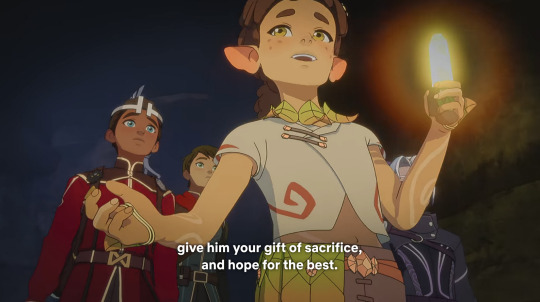
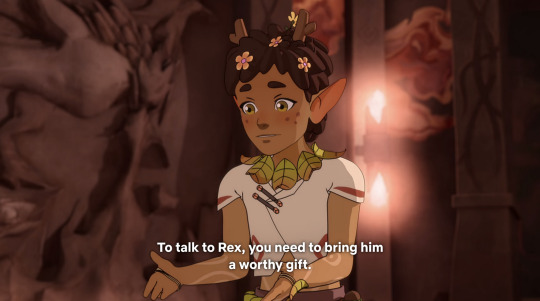
However, Ezran points out the major flaw in this line of thinking, as "We offered gifts that meant a lot to us, but the truth is, they don't mean anything to you." Not everyone is going to value the same thing or think the same thing is worth the price that was paid.
We see this interpersonally most with the mage fam ("Maybe the world would be better off without magic" from Soren, whose life was saved with it) and with Rayla and Callum (as Rayla's gift of sacrifice by leaving is something Callum did not want and rightfully did not receive well, alongside her moonstone pendant). Again: what is defined as worthy, or worthiness, is in the eye of the beholder.
Just like one of the initial thoughts that inspired this meta, Khessa asserts that dark magic is a magic that "takes" > being reciprocal for both parties, nevermind a gift. The irony, however, runs a bit deeper, as Aaravos thinks the same of his fellow stars:
But the stars kept from them one secret still: that their first lesson—patience—was not a gift of the stars at all. You see, patience is a lesson the humans taught themselves. No, the stars do not know patience, for they have no need for it. The stars want for nothing, and take all to their liking.
And we see this idea of a 'false gift' show up time and time again in the series. Nyx pretends to offer passage but actually wants to steal Zym; Rayla's act of love in leaving is a curse upon Callum's heart and wellbeing; dark magic itself is a false trade of sorts, given how unevenly it tips scales in Aaravos' favour and how much it ruins both the environment and body of its caster.
[The elven thief Lasair] never saw the precious blossoms fade and turn to cold ashes when exposed to the dawn. They never learned their gift was perceived as a curse, not a trade.
—Tales of Xadia
Kim'Dael goes to Queen Aditi under false pretences ("The Queen's Mercy") but the gift that Aditi gives her is nothing good at all:
What pretty bauble, she wondered, had she tricked the queen into forging as a token of protection? What could be powerful enough to ward away the wrath of dragons?
Just as humans sought the stars' help to protect them from the ire of the dragons, Kim'Dael sought Aditi's. And just as Aaravos offered them a false magic that would protect and ultimately trap/destroy then, so does Aditi, with magic that doesn't seem to be entirely dark or primal:
“But know this: the binding around your neck—it is made with magic not unlike your own. It is a magic that demands, that takes."
A form of magic even maybe that demands sacrifice for that kind of Power.
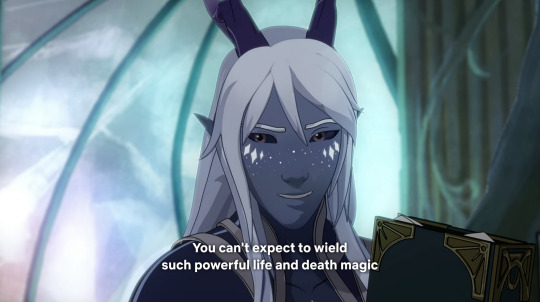
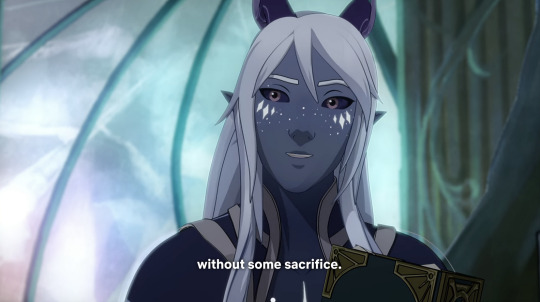
You could almost say it's something Deeper.
Conclusion
Hope you enjoyed going completely off the rails with me, and that this long (winded) post got you thinking! I'll probably do a followup discussing the implications of what we have here for potential Laurelion-Aaravos later. In the meantime, take the fruits of my labour, and spin your own hamster wheels if you'd like.
#rolling around the very concept of ‘gift’ in my head and the implications therein#as in what is and what ISN’T considered a gift#particularly when the giver and the recipient have different opinions#when does a gift become a curse and when does a curse become a gift etc#and when is a gift truly absolutely nothing at all#HRMMMMM#speculation
48 notes
·
View notes
Text
Okay, hear me out.
.
.
.
Turn them vertically.
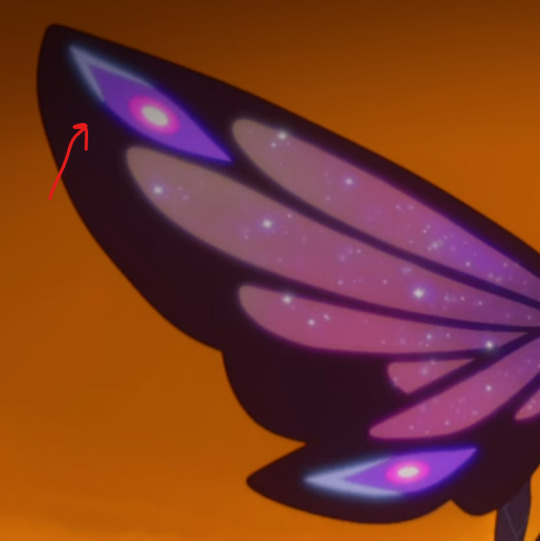

A similar eye motif methinks
169 notes
·
View notes
Text
Oh let me meditate on the beast of devouring that feeds on the stars, that star devourer dragon Let me repel this Star dragon and banish it from the light of my Sun
- Ancient Sunfire chant, Tales of Xadia
I'm thinking about the sun and the stars and how Laurelion is, probably, both.
(Reposted because I’m a damn fool!!)
The Big Bang, in real life
The majority of atoms which make up us, our earth, and even our very own sun, were formed in the hearts of the very first stars in the universe.
These stars were made of lighter elements, mostly Hydrogen, Helium, and Lithium. But under the immense pressure at the core of those first stars, heavier atoms like Carbon, Oxygen and Nitrogen were formed. The stars eventually died - exploded - and released those heavier elements into the universe to be crafted into other forms.
As Carl Sagan famously put it, "We are made of star stuff."
And so Aaravos's quote in the teaser for season six - We are, all of us, stardust - is a blatant nod to the Sagan quote as well as, I am assuming, that aspect of the universe in some shape or form. Allegorically, it speaks to the idea of the universality of existence in the basest sense. But also, it acknowledges that the stars, like everything else, operate generationally.
So in this way, if we are to assume the TDP cosmos operates at least somewhat similar to our own, Xadia's sun is a younger (but still old as balls) star, from a different generation than the stars which are far more distant and ancient.
(As a side note, the very first stars in the universe did not last very long. Though certain stars in existence right now have "lifetimes" which are projected to last longer than the universe has currently been in existence.)
So if Xadia's sun is technically a star, even by Xadia's own admission (see Sunfire chant), then by this metric I have to ask...
What makes the Sun arcanum different from the Star arcanum?
While those first, most ancient of stars produced the materials which would become life, only a sun can sustain life and is therefore inextricably linked with the earth and all the life on it. It's this connection which I imagine is responsible for the change in the nature of the magic.
In Callum's Spellbook, Callum makes some word-association lists for the different types of magic. He associates "truth" with both Sun and Star (perhaps a trait of their shared stardom). No other words match up completely, but it feels like they are referencing similar things within different contexts.
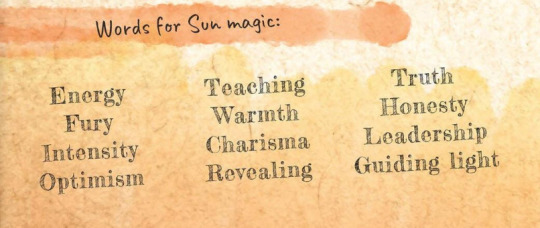
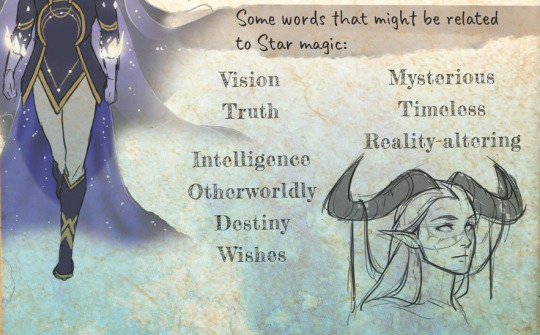
The Sun teaches while the Stars are simply intelligent; the Sun is a "guiding light" while the Stars are associated with "destiny." Further, many of the other words Callum associates with the sun are about being in positive community with others (optimism, warmth, charisma, leadership). The nature of the sun is more giving, nurturing, and dare I say loving than that of your average star. Sun is revealing and honesty, Star is mysterious and reality-altering. Further, there is a dynamism in the words for Sun Magic that is absent from Star Magic - sharing knowledge vs simply having knowledge, guiding vs prescribing a set path.
(Another side note: Callum also mentions that Star mages are born, which, Callum's limited understanding aside, is perhaps a hint about what it will take to connect to the Star Arcanum. I have thoughts, but.... I'll just leave that there, winky face)
Obviously, these word associations can only go so far. Some of the most hostile and arrogant (eh eh!!) figures we've met have been Sun-aligned. But it does make me wonder about the beginning of Sun magic and what that introduction may have looked like.
Ever wonder what those sparkly dots are up there?*
Okay, so big question for me. Is Aaravos a star, like, literally a personification of a ball of gas burning billions of miles away, or is he just like, a very special elf? The same goes for all Startouch elves.
Zubeia refers to Aaravos as both a star and as an elf, and it's one of those things which I can't decide is real or simply a more poetic way of speaking of him. Is "Startouch elf" simply another type of star? Official art also sometimes depicts him and others as constellations. Are they the formed consciousness of a collection stars?
But it also makes me think of how often Sunfire elves personify the sun/the sun orb.
JANAI: You are a student of history, yes? Do you know where the Great Orb of the Sunforge came from?
KARIM: Legends say it was a gift from the Sun herself. The gift of a millenium. - "The Drakewood," S4E6
In "The Queen's Mercy," we have...
Aditi nodded. “[...]and so, as the Sun’s daughter, I will lead you into her embrace.”
...and earlier, there is this:
Queen Aditi the Merciful, they called her.
Queen Aditi the Kind.
The Light of the Sun Incarnate.
Kim’dael had thought it all an insufferable exaggeration. Sunfire elves gilded everything they could touch, of course they would do the same to their beloved leader.
Karim personifies the corrupted sun orb in "After Darkness":
He could still see it: the top of the Sunforge Tower, upside-down from where he lay, shrouded in inky corruption. It looked ill, its sickness weeping red and crowning the spire in a haze of blood.
[...]
We will come back, he promised his beloved, tainted city, his lost home. We will not abandon you. The orb pulsed mutely, a cry for help he could not answer.
TDP uses personification a lot, so it is kind of hard to parse out when it's being literal and when it's being lyrical. Perhaps in the examples cited it's simply the ostentatious way of the Sunfire elves like Kim'dael thinks. But if Aaravos, a known person, can be a star, then I can easily reason vice versa.
In the Book 1 novelization, Aaravos refers to himself as "of the First Elves." And if that is true, it follows that there must have been "Second Elves."
So who is Laurelion?
The significance of the laurel in the Western canon goes back to the myth of Daphne and Apollo.
There are various versions of the story, but essentially, Apollo (popularly associated with the sun), falls helplessly in love with Daphne. Though her reasons vary in different iterations, Daphne turns away from Apollo's affections. She runs and Apollo pursues. Just as Apollo is about to catch her, she begs for help - sometimes from her father, a river god, and sometimes from her mother, a nymph or Gaia - and she is saved by being turned into the laurel tree. In Ovid's Metamorphosis, when Apollo reaches Daphne post-transfiguration, he can still feel her heart beating below the bark. From that point on, the laurel wreath was associated with Apollo, achievement, and victory.
Gold, the element, takes the symbol Au from its Latin word, Aurum, which has etymological ties to 'aurora' (dawn). Names likes Aurelio or Aurelius similarly mean "golden" or "guilded."
So, taken together, I of course think immediately of this:
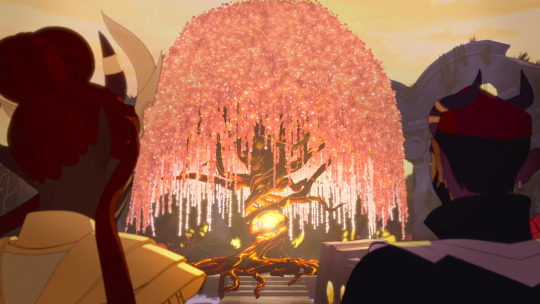
THAT BEING SAID, this looks more like a weeping willow or a wisteria than it does a laurel, which has bushy foliage rather than hanging. The closest I can maybe get is a mountain laurel, which does have blooms that hang kinda sorta like a wisteria, though not nearly in such a dramatic fashion. But anyway!
The golden laurel...⋆。°✩Laurelion✩°。⋆
Interestingly, in Ovid's retelling of Apollo and Daphne, Apollo's love is the result of being struck by Cupid's golden arrow, while Daphne's disgust of Apollo's advances are the result of being struck by a lead-tipped arrow. And so, there is an association there with gold and love. And within the context of the myth - Cupid is getting petty revenge on Apollo after Apollo is boastful and arrogant about his own prowess with a bow and arrow - it's also an instance of weaponizing love.
Which brings us to that which is known everforth as...
The Nova Blade
It is actually quite common for stars to have companions and to exist in what is called a binary star system. In this system, two stars are gravitationally locked in orbit and can appear as a single object when observed by the naked eye. Sometimes, the proximity between these two stars results in what is called a nova - a sudden brightness which appears to be a new star. Novas are not associated with stellar "death" (you'd be thinking of supernova, in that case).
Now in our universe, novas are not actually stars. They are events, momentary bursts of brightness under specific circumstances between two stars. But the name "nova" originally came from the term "stella nova" which means new star.
…and though undying, took last breath, immortal Laurelion was no more.
- "The Death of the Immortal"
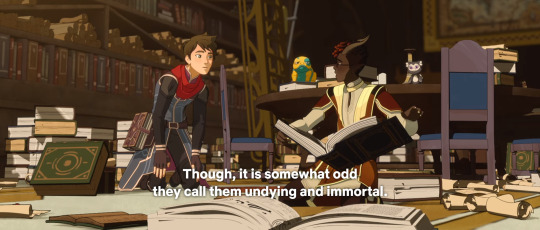
Did Laurelion just...die? You know, it was really unclear...
I do not think the Nova Blade killed Laurelion in the moment described in the poem. Kazi is so doubtful and Callum is so sure - Callum you fool! - surely that would be too easy (quote quote easy)?
I will grant that "Supernova Blade" would sound kind of hokey, and even originally I had thought, "Oh cool, 'nova,' like 'SUPERnova!'" And then I thought to look up just 'nova' and it turns out it was actually its own thing. But even without all that, the 'though-undying' of it all haunts me.
And so I hold to the idea that the Nova Blade makes an immortal mortal. It does bring death's bite, but in a way in which Laurelion becomes something else, reborn with death's promise like all other mortal beings are.
I have two point five ideas.
The Light of the Sun Incarnate
My first hypothesis is, of course, that Laurelion became the tree with the Sunseed with a name that's a nod to Daphne and Apollo. Of course, I'm assuming here that the tree in which the Sunseed is kept is responsible for producing/sustaining the Sunseed, which may not be true.
Now the drawback of this idea is the legend that the Sunseed was a gift from the Sun herself. So here, it would have to be within the context of the Sun sacrificing Laurelion in some way for this purpose. There's obvious Jesus parallels here which, full disclosure, is not really my bag, baby, but there are plenty of elements in TDP that very easily slot in with Christian canon. But also, in the laurel myth Daphne begs a parent to save her, which puts the sacrifice of it all in a different light. It makes me wonder if the event with the Nova Blade is self-inflicted and, mayhaps, an act of love. So in this sense, the Sun "gifted" the world (or just the Sunfire elves, I dunno) her child by simply letting her child go.
My second hypothesis is that Laurelion became the first Sunfire elf, of the second elves. We are, all of us, stardust. It would not come as a shock to me if all elves were ultimately descended from the Startouch elves of old.
AND THEN we've got Aaron Ehasz talking about how the red dragon scale amulet (...and look, this show does color coding, that's SUN) is somehow related to Laurelion?
Sunfire elf, I say! SUNFIRE ELF!
Combining both of these scenarios, I could see Laurelion being the child of the Sun (again IF we are to assume each star is a living entity). Or maybe Startouch elves are born OF stars while not, technically, being the same thing, like an egg hatching the next evolution of its mother.
And so, perhaps Laurelion chose to become mortal, to become the first Sunfire Elf. And all of Laurelion's children, and their children's children, and their children's children's children, they were all of them children of the sun, the light of the sun incarnate, bringing the hope and optimism of something new to the world; destined to return in death to the embrace of their very first mother. And as a symbol of her love, the Sun gifted Laurelion the Sunseed, golden and cradled within a tree.
*oddly relevant Lion King reference
29 notes
·
View notes
Text
Oh let me meditate on the beast of devouring that feeds on the stars, that star devourer dragon Let me repel this Star dragon and banish it from the light of my Sun
- Ancient Sunfire chant, Tales of Xadia
I'm thinking about the sun and the stars and how Laurelion is, probably, both.
(Reposted because I’m a damn fool!!)
The Big Bang, in real life
The majority of atoms which make up us, our earth, and even our very own sun, were formed in the hearts of the very first stars in the universe.
These stars were made of lighter elements, mostly Hydrogen, Helium, and Lithium. But under the immense pressure at the core of those first stars, heavier atoms like Carbon, Oxygen and Nitrogen were formed. The stars eventually died - exploded - and released those heavier elements into the universe to be crafted into other forms.
As Carl Sagan famously put it, "We are made of star stuff."
And so Aaravos's quote in the teaser for season six - We are, all of us, stardust - is a blatant nod to the Sagan quote as well as, I am assuming, that aspect of the universe in some shape or form. Allegorically, it speaks to the idea of the universality of existence in the basest sense. But also, it acknowledges that the stars, like everything else, operate generationally.
So in this way, if we are to assume the TDP cosmos operates at least somewhat similar to our own, Xadia's sun is a younger (but still old as balls) star, from a different generation than the stars which are far more distant and ancient.
(As a side note, the very first stars in the universe did not last very long. Though certain stars in existence right now have "lifetimes" which are projected to last longer than the universe has currently been in existence.)
So if Xadia's sun is technically a star, even by Xadia's own admission (see Sunfire chant), then by this metric I have to ask...
What makes the Sun arcanum different from the Star arcanum?
While those first, most ancient of stars produced the materials which would become life, only a sun can sustain life and is therefore inextricably linked with the earth and all the life on it. It's this connection which I imagine is responsible for the change in the nature of the magic.
In Callum's Spellbook, Callum makes some word-association lists for the different types of magic. He associates "truth" with both Sun and Star (perhaps a trait of their shared stardom). No other words match up completely, but it feels like they are referencing similar things within different contexts.


The Sun teaches while the Stars are simply intelligent; the Sun is a "guiding light" while the Stars are associated with "destiny." Further, many of the other words Callum associates with the sun are about being in positive community with others (optimism, warmth, charisma, leadership). The nature of the sun is more giving, nurturing, and dare I say loving than that of your average star. Sun is revealing and honesty, Star is mysterious and reality-altering. Further, there is a dynamism in the words for Sun Magic that is absent from Star Magic - sharing knowledge vs simply having knowledge, guiding vs prescribing a set path.
(Another side note: Callum also mentions that Star mages are born, which, Callum's limited understanding aside, is perhaps a hint about what it will take to connect to the Star Arcanum. I have thoughts, but.... I'll just leave that there, winky face)
Obviously, these word associations can only go so far. Some of the most hostile and arrogant (eh eh!!) figures we've met have been Sun-aligned. But it does make me wonder about the beginning of Sun magic and what that introduction may have looked like.
Ever wonder what those sparkly dots are up there?*
Okay, so big question for me. Is Aaravos a star, like, literally a personification of a ball of gas burning billions of miles away, or is he just like, a very special elf? The same goes for all Startouch elves.
Zubeia refers to Aaravos as both a star and as an elf, and it's one of those things which I can't decide is real or simply a more poetic way of speaking of him. Is "Startouch elf" simply another type of star? Official art also sometimes depicts him and others as constellations. Are they the formed consciousness of a collection stars?
But it also makes me think of how often Sunfire elves personify the sun/the sun orb.
JANAI: You are a student of history, yes? Do you know where the Great Orb of the Sunforge came from?
KARIM: Legends say it was a gift from the Sun herself. The gift of a millenium. - "The Drakewood," S4E6
In "The Queen's Mercy," we have...
Aditi nodded. “[...]and so, as the Sun’s daughter, I will lead you into her embrace.”
...and earlier, there is this:
Queen Aditi the Merciful, they called her.
Queen Aditi the Kind.
The Light of the Sun Incarnate.
Kim’dael had thought it all an insufferable exaggeration. Sunfire elves gilded everything they could touch, of course they would do the same to their beloved leader.
Karim personifies the corrupted sun orb in "After Darkness":
He could still see it: the top of the Sunforge Tower, upside-down from where he lay, shrouded in inky corruption. It looked ill, its sickness weeping red and crowning the spire in a haze of blood.
[...]
We will come back, he promised his beloved, tainted city, his lost home. We will not abandon you. The orb pulsed mutely, a cry for help he could not answer.
TDP uses personification a lot, so it is kind of hard to parse out when it's being literal and when it's being lyrical. Perhaps in the examples cited it's simply the ostentatious way of the Sunfire elves like Kim'dael thinks. But if Aaravos, a known person, can be a star, then I can easily reason vice versa.
In the Book 1 novelization, Aaravos refers to himself as "of the First Elves." And if that is true, it follows that there must have been "Second Elves."
So who is Laurelion?
The significance of the laurel in the Western canon goes back to the myth of Daphne and Apollo.
There are various versions of the story, but essentially, Apollo (popularly associated with the sun), falls helplessly in love with Daphne. Though her reasons vary in different iterations, Daphne turns away from Apollo's affections. She runs and Apollo pursues. Just as Apollo is about to catch her, she begs for help - sometimes from her father, a river god, and sometimes from her mother, a nymph or Gaia - and she is saved by being turned into the laurel tree. In Ovid's Metamorphosis, when Apollo reaches Daphne post-transfiguration, he can still feel her heart beating below the bark. From that point on, the laurel wreath was associated with Apollo, achievement, and victory.
Gold, the element, takes the symbol Au from its Latin word, Aurum, which has etymological ties to 'aurora' (dawn). Names likes Aurelio or Aurelius similarly mean "golden" or "guilded."
So, taken together, I of course think immediately of this:

THAT BEING SAID, this looks more like a weeping willow or a wisteria than it does a laurel, which has bushy foliage rather than hanging. The closest I can maybe get is a mountain laurel, which does have blooms that hang kinda sorta like a wisteria, though not nearly in such a dramatic fashion. But anyway!
The golden laurel...⋆。°✩Laurelion✩°。⋆
Interestingly, in Ovid's retelling of Apollo and Daphne, Apollo's love is the result of being struck by Cupid's golden arrow, while Daphne's disgust of Apollo's advances are the result of being struck by a lead-tipped arrow. And so, there is an association there with gold and love. And within the context of the myth - Cupid is getting petty revenge on Apollo after Apollo is boastful and arrogant about his own prowess with a bow and arrow - it's also an instance of weaponizing love.
Which brings us to that which is known everforth as...
The Nova Blade
It is actually quite common for stars to have companions and to exist in what is called a binary star system. In this system, two stars are gravitationally locked in orbit and can appear as a single object when observed by the naked eye. Sometimes, the proximity between these two stars results in what is called a nova - a sudden brightness which appears to be a new star. Novas are not associated with stellar "death" (you'd be thinking of supernova, in that case).
Now in our universe, novas are not actually stars. They are events, momentary bursts of brightness under specific circumstances between two stars. But the name "nova" originally came from the term "stella nova" which means new star.
…and though undying, took last breath, immortal Laurelion was no more.
- "The Death of the Immortal"

Did Laurelion just...die? You know, it was really unclear...
I do not think the Nova Blade killed Laurelion in the moment described in the poem. Kazi is so doubtful and Callum is so sure - Callum you fool! - surely that would be too easy (quote quote easy)?
I will grant that "Supernova Blade" would sound kind of hokey, and even originally I had thought, "Oh cool, 'nova,' like 'SUPERnova!'" And then I thought to look up just 'nova' and it turns out it was actually its own thing. But even without all that, the 'though-undying' of it all haunts me.
And so I hold to the idea that the Nova Blade makes an immortal mortal. It does bring death's bite, but in a way in which Laurelion becomes something else, reborn with death's promise like all other mortal beings are.
I have two point five ideas.
The Light of the Sun Incarnate
My first hypothesis is, of course, that Laurelion became the tree with the Sunseed with a name that's a nod to Daphne and Apollo. Of course, I'm assuming here that the tree in which the Sunseed is kept is responsible for producing/sustaining the Sunseed, which may not be true.
Now the drawback of this idea is the legend that the Sunseed was a gift from the Sun herself. So here, it would have to be within the context of the Sun sacrificing Laurelion in some way for this purpose. There's obvious Jesus parallels here which, full disclosure, is not really my bag, baby, but there are plenty of elements in TDP that very easily slot in with Christian canon. But also, in the laurel myth Daphne begs a parent to save her, which puts the sacrifice of it all in a different light. It makes me wonder if the event with the Nova Blade is self-inflicted and, mayhaps, an act of love. So in this sense, the Sun "gifted" the world (or just the Sunfire elves, I dunno) her child by simply letting her child go.
My second hypothesis is that Laurelion became the first Sunfire elf, of the second elves. We are, all of us, stardust. It would not come as a shock to me if all elves were ultimately descended from the Startouch elves of old.
AND THEN we've got Aaron Ehasz talking about how the red dragon scale amulet (...and look, this show does color coding, that's SUN) is somehow related to Laurelion?
Sunfire elf, I say! SUNFIRE ELF!
Combining both of these scenarios, I could see Laurelion being the child of the Sun (again IF we are to assume each star is a living entity). Or maybe Startouch elves are born OF stars while not, technically, being the same thing, like an egg hatching the next evolution of its mother.
And so, perhaps Laurelion chose to become mortal, to become the first Sunfire Elf. And all of Laurelion's children, and their children's children, and their children's children's children, they were all of them children of the sun, the light of the sun incarnate, bringing the hope and optimism of something new to the world; destined to return in death to the embrace of their very first mother. And as a symbol of her love, the Sun gifted Laurelion the Sunseed, golden and cradled within a tree.
*oddly relevant Lion King reference
#the dragon prince#laurelion#speculation#you all i am a fuck up and deleted the original post#in case the “keep reading” doesn't work for you#here it is
29 notes
·
View notes
Text

(read more link is dead - go here)
Oh let me meditate on the beast of devouring that feeds on the stars, that star devourer dragon
Let me repel this Star dragon and banish it from the light of my Sun
- Ancient Sunfire chant, Tales of Xadia
I'm thinking about the sun and the stars and how Laurelion is, probably, both.
The Big Bang, in real life
The majority of atoms which make up us, our earth, and even our very own sun, were formed in the hearts of the very first stars in the universe.
These stars were made of lighter elements, mostly Hydrogen, Helium, and Lithium. But under the immense pressure at the core of those first stars, heavier atoms like Carbon, Oxygen and Nitrogen were formed. The stars eventually died - exploded - and released those heavier elements into the universe to be crafted into other forms.
As Carl Sagan famously put it, "We are made of star stuff."
And so Aaravos's quote in the teaser for season six - We are, all of us, stardust - is a blatant nod to the Sagan quote as well as, I am assuming, that aspect of the universe in some shape or form. Allegorically, it speaks to the idea of the universality of existence in the basest sense. But also, it acknowledges that the stars, like everything else, operate generationally.
So in this way, if we are to assume the TDP cosmos operates at least somewhat similar to our own, Xadia's sun is a younger (but still old as balls) star, from a different generation than the stars which are far more distant and ancient.
(As a side note, the very first stars in the universe did not last very long. Though certain stars in existence right now have "lifetimes" which are projected to last longer than the universe has currently been in existence.)
So if Xadia's sun is technically a star, even by Xadia's own admission (see Sunfire chant), then by this metric I have to ask...
What makes the Sun arcanum different from the Star arcanum?
While those first, most ancient of stars produced the materials which would become life, only a sun can sustain life and is therefore inextricably linked with the earth and all the life on it. It's this connection which I imagine is responsible for the change in the nature of the magic.
In Callum's Spellbook, Callum makes some word-association lists for the different types of magic. He associates "truth" with both Sun and Star (perhaps a trait of their shared stardom). No other words match up completely, but it feels like they are referencing similar things within different contexts.
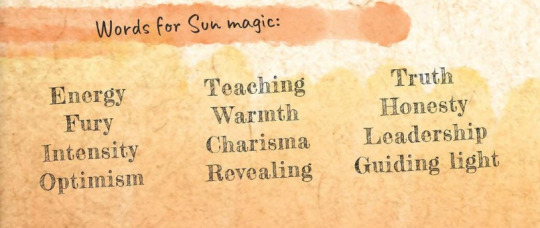

The Sun teaches while the Stars are simply intelligent; the Sun is a "guiding light" while the Stars are associated with "destiny." Further, many of the other words Callum associates with the sun are about being in positive community with others (optimism, warmth, charisma, leadership). The nature of the sun is more giving, nurturing, and dare I say loving than that of your average star. Sun is revealing and honesty, Star is mysterious and reality-altering. Further, there is a dynamism in the words for Sun Magic that is absent from Star Magic - sharing knowledge vs simply having knowledge, guiding vs prescribing a set path.
(Another side note: Callum also mentions that Star mages are born, which, Callum's limited understanding aside, is perhaps a hint about what it will take to connect to the Star Arcanum. I have thoughts, but.... I'll just leave that there, winky face)
Obviously, these word associations can only go so far. Some of the most hostile and arrogant (eh eh!!) figures we've met have been Sun-aligned. But it does make me wonder about the beginning of Sun magic and what that introduction may have looked like.
Ever wonder what those sparkly dots are up there?*
Okay, so big question for me. Is Aaravos a star, like, literally a personification of a ball of gas burning billions of miles away, or is he just like, a very special elf? The same goes for all Startouch elves.
Zubeia refers to Aaravos as both a star and as an elf, and it's one of those things which I can't decide is real or simply a more poetic way of speaking of him. Is "Startouch elf" simply another type of star? Official art also sometimes depicts him and others as constellations. Are they the formed consciousness of a collection stars?
But it also makes me think of how often Sunfire elves personify the sun/the sun orb.
JANAI: You are a student of history, yes? Do you know where the Great Orb of the Sunforge came from?
KARIM: Legends say it was a gift from the Sun herself. The gift of a millenium.
- "The Drakewood," S4E6
In "The Queen's Mercy," we have...
Aditi nodded. “[...]and so, as the Sun’s daughter, I will lead you into her embrace.”
...and earlier, there is this:
Queen Aditi the Merciful, they called her.
Queen Aditi the Kind.
The Light of the Sun Incarnate.
Kim’dael had thought it all an insufferable exaggeration. Sunfire elves gilded everything they could touch, of course they would do the same to their beloved leader.
Karim personifies the corrupted sun orb in "After Darkness":
He could still see it: the top of the Sunforge Tower, upside-down from where he lay, shrouded in inky corruption. It looked ill, its sickness weeping red and crowning the spire in a haze of blood.
[...]
We will come back, he promised his beloved, tainted city, his lost home. We will not abandon you.
The orb pulsed mutely, a cry for help he could not answer.
TDP uses personification a lot, so it is kind of hard to parse out when it's being literal and when it's being lyrical. Perhaps in the examples cited it's simply the ostentatious way of the Sunfire elves like Kim'dael thinks. But if Aaravos, a known person, can be a star, then I can easily reason vice versa.
In the Book 1 novelization, Aaravos refers to himself as "of the First Elves." And if that is true, it follows that there must have been "Second Elves."
So who is Laurelion?
The significance of the laurel in the Western canon goes back to the myth of Daphne and Apollo.
There are various versions of the story, but essentially, Apollo (popularly associated with the sun), falls helplessly in love with Daphne. Though her reasons vary in different iterations, Daphne turns away from Apollo's affections. She runs and Apollo pursues. Just as Apollo is about to catch her, she begs for help - sometimes from her father, a river god, and sometimes from her mother, a nymph or Gaia - and she is saved by being turned into the laurel tree. In Ovid's Metamorphosis, when Apollo reaches Daphne post-transfiguration, he can still feel her heart beating below the bark. From that point on, the laurel wreath was associated with Apollo, achievement, and victory.
Gold, the element, takes the symbol Au from its Latin word, Aurum, which has etymological ties to 'aurora' (dawn). Names likes Aurelio or Aurelius similarly mean "golden" or "guilded."
So, taken together, I of course think immediately of this:
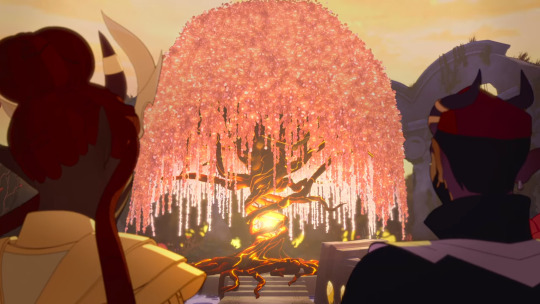
THAT BEING SAID, this looks more like a weeping willow or a wisteria than it does a laurel, which has bushy foliage rather than hanging. The closest I can maybe get is a mountain laurel, which does have blooms that hang kinda sorta like a wisteria, though not nearly in such a dramatic fashion. But anyway!
The golden laurel...⋆。°✩Laurelion✩°。⋆
Interestingly, in Ovid's retelling of Apollo and Daphne, Apollo's love is the result of being struck by Cupid's golden arrow, while Daphne's disgust of Apollo's advances are the result of being struck by a lead-tipped arrow. And so, there is an association there with gold and love. And within the context of the myth - Cupid is getting petty revenge on Apollo after Apollo is boastful and arrogant about his own prowess with a bow and arrow - it's also an instance of weaponizing love.
Which brings us to that which is known everforth as...
The Nova Blade
It is actually quite common for stars to have companions and to exist in what is called a binary star system. In this system, two stars are gravitationally locked in orbit and can appear as a single object when observed by the naked eye. Sometimes, the proximity between these two stars results in what is called a nova - a sudden brightness which appears to be a new star. Novas are not associated with stellar "death" (you'd be thinking of supernova, in that case).
Now in our universe, novas are not actually stars. They are events, momentary bursts of brightness under specific circumstances between two stars. But the name "nova" originally came from the term "stella nova" which means new star.
…and though undying, took last breath,
immortal Laurelion was no more.
- "The Death of the Immortal"

Did Laurelion just...die? You know, it was really unclear...
I do not think the Nova Blade killed Laurelion in the moment described in the poem. Kazi is so doubtful and Callum is so sure - Callum you fool! - surely that would be too easy (quote quote easy)?
I will grant that "Supernova Blade" would sound kind of hokey, and even originally I had thought, "Oh cool, 'nova,' like 'SUPERnova!'" And then I thought to look up just 'nova' and it turns out it was actually its own thing. But even without all that, the 'though-undying' of it all haunts me.
And so I hold to the idea that the Nova Blade makes an immortal mortal. It does bring death's bite, but in a way in which Laurelion becomes something else, reborn with death's promise like all other mortal beings are.
I have two point five ideas.
The Light of the Sun Incarnate
My first hypothesis is, of course, that Laurelion became the tree with the Sunseed with a name that's a nod to Daphne and Apollo. Of course, I'm assuming here that the tree in which the Sunseed is kept is responsible for producing/sustaining the Sunseed, which may not be true.
Now the drawback of this idea is the legend that the Sunseed was a gift from the Sun herself. So here, it would have to be within the context of the Sun sacrificing Laurelion in some way for this purpose. There's obvious Jesus parallels here which, full disclosure, is not really my bag, baby, but there are plenty of elements in TDP that very easily slot in with Christian canon. But also, in the laurel myth Daphne begs a parent to save her, which puts the sacrifice of it all in a different light. It makes me wonder if the event with the Nova Blade is self-inflicted and, mayhaps, an act of love. So in this sense, the Sun "gifted" the world (or just the Sunfire elves, I dunno) her child by simply letting her child go.
My second hypothesis is that Laurelion became the first Sunfire elf, of the second elves. We are, all of us, stardust. It would not come as a shock to me if all elves were ultimately descended from the Startouch elves of old.
AND THEN we've got Aaron Ehasz talking about how the red dragon scale amulet (...and look, this show does color coding, that's SUN) is somehow related to Laurelion?
Sunfire elf, I say! SUNFIRE ELF!
Combining both of these scenarios, I could see Laurelion being the child of the Sun (again IF we are to assume each star is a living entity). Or maybe Startouch elves are born OF stars while not, technically, being the same thing, like an egg hatching the next evolution of its mother.
And so, perhaps Laurelion chose to become mortal, to become the first Sunfire Elf. And all of Laurelion's children, and their children's children, and their children's children's children, they were all of them children of the sun, the light of the sun incarnate, bringing the hope and optimism of something new to the world; destined to return in death to the embrace of their very first mother. And as a symbol of her love, the Sun gifted Laurelion the Sunseed, golden and cradled within a tree.
*oddly relevant Lion King reference
#oh? oh my god?#OH MY GOD#OH MY GOD!!!#is THAT why aaravos can control DM users???#im freakin screamin#speculation#dark magic#blood magic#ALSO FUCK yall I accidentally deleted the original post LOL
38 notes
·
View notes
Text

"No, he's the same.
He's my father."
from TDP Reflections: Strangers
88 notes
·
View notes
Photo

in which viren goes on a joint family vacation and finds himself caught between his longtime crush/bff and the hot surfer elf who hosts his airbnb
( me and @mickequ are in tdp AU hell )
10K notes
·
View notes
Photo

lmao did you think Claudia was the only one who knows that spell
#was looking for another post and stumbled on this one again#I want to say crass things about the slime but I will refrain#kradog you wound me you kill me#viren#aaravos#viravos
116 notes
·
View notes
Text
Please consider blooshy Viren
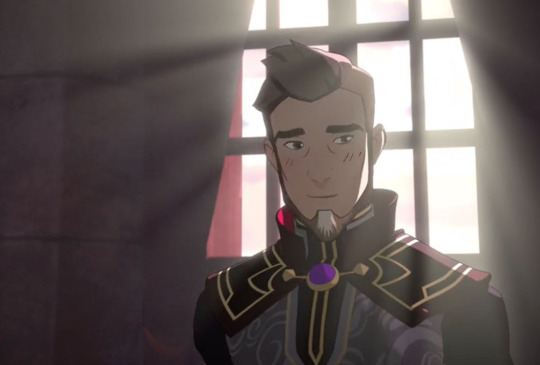
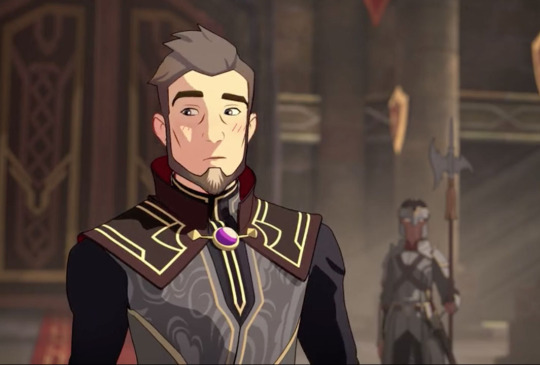
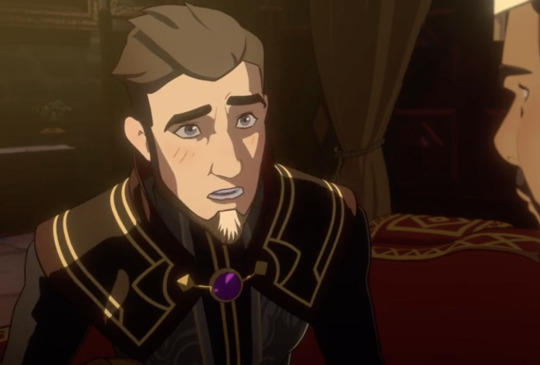
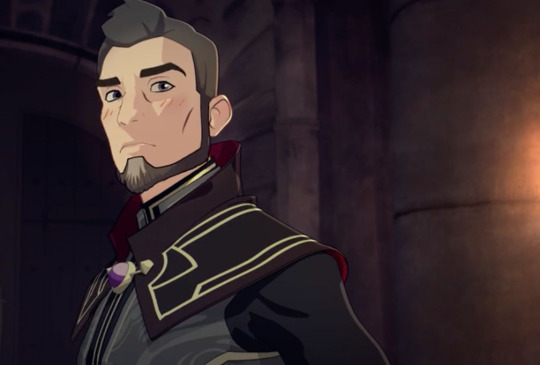

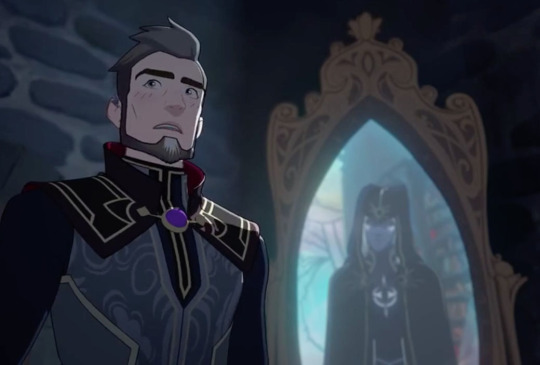


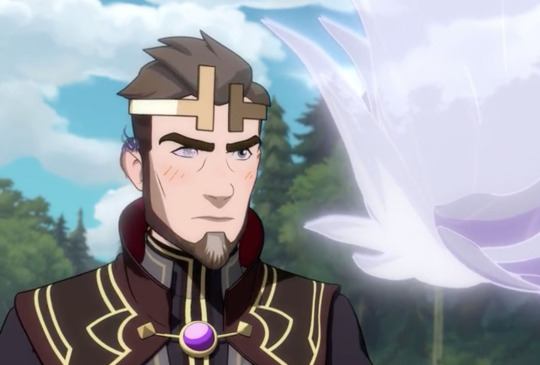

312 notes
·
View notes
Text
I'd Do Anything (... But I Won't Do That)
This started out kind of weird and petty but then turned into an actual thing about the relationship of Viren's character arc(s) to the Arc 2 "I'll do anything for you" theme, because that's actually pretty important for the context of how both Callum and Claudia will have to confront the same conflict.
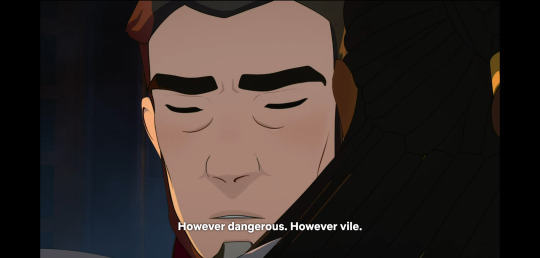
Pictured: Do NOT take a shot every time we get a callback to this line, you will die.
Basically, the petty part is that I think evaluating Viren's Arc 1 decisions through the "I will do anything for my family" lens is... disingenuous is too strong a word, but maybe simplistic? The "Viren doesn't reveal/offer the egg to save Harrow's life because he's too preoccupied with hanging on to his own power" take has never sat right with me because the real core problem of Viren is a lot more complex than just "he's lying (to himself)," it's a whole pattern of denying his own agency in doubling down on his mistakes. He'll make one bad/selfish decision, and it becomes a cascade of subsequent actions that he sees as being unavoidable, but that aren't necessarily even informed by the same reasoning or values as the initial decision. Like everything else in Viren's dream, Kpp'Ar's take that his choices are all oriented toward power is both accurate and not necessarily as literal as it seems.
Because, like... Viren's not actually a manipulator or even much of a planner—he's a very skilled opportunist. That's why all his choices wind up being based entirely on the context of past choices, and frequently make no sense when you look at them from a "hey buddy, where exactly do you think you're going with this" angle. It also contributes to why he's so desperate for control all the time, in that he acts primarily in a reactive way rather than proactively, which is always an inherently less secure position.
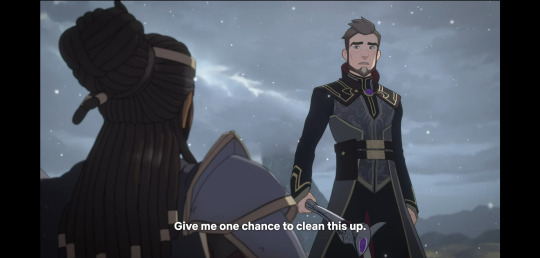
Pictured: The kind of statement that definitely always leads to things going super well.
Even taking the egg in the first place is a reactive decision—not that he doesn't make a choice there, or that he doesn't choose power over the threat he believes the egg poses, but he did actually walk all the way up the Storm Spire, fight five or six Dragonguard, and get kicked down a flight of stairs with the intent of destroying it. He didn't argue with Harrow about destroying it while secretly planning to take it for himself. He only even thinks of it as a weapon because Tiadrin planted the idea in his mind—as an opportunist, the temptation to leave an avenue to power open rather than close it off is what he can't resist. He sat on Sarai's last breath for ten years waiting for a chance to weaponize it to maximum effect, he can sit (figuratively... or literally, I'm not gonna stop him) on the egg for as long as it takes for an appropriate use it to appear. Tiadrin even specifically encourages that he not "waste" it, both specifically by destroying it now, and implicitly by using it too quickly and foolishly.

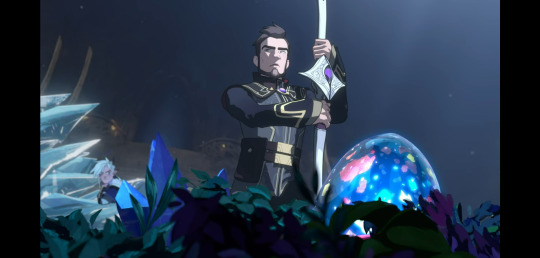
Pictured: Smart mom, dumb ass.
Tiadrin's angle, of course, is that the longer Viren hangs on to the egg without actually using it, the higher the chance it can be recovered. She doesn't know that Viren will leave things in a state where the assumption is that the egg was destroyed, meaning no one will think to try recovering it, but that's not really her fault and it still pays off.
The gamble Viren makes, on the other hand, is that the opportunities the egg affords will be worth the risk of it somehow falling back into Xadian hands. If the egg returns to Xadia alive, he's back to square "his name will be vengeance" in the game of We Killed the Dragon King. So yeah, you could say Viren values keeping the egg over Harrow's life, but in doing that he's actually operating largely on the exact same values and beliefs that made him argue for destroying it in the first place. It's just that his prior choice of risking humanity's security for the sake of potentially world-altering power has backfired in the context of an immediate and direct threat to Harrow's life. Really, the entire rest of s1 and s2 are him doubling down specifically on keeping the egg from returning to Xadia while also milking the opportunities coming from that course—e.g. the egg cannot go back to Xadia, therefore Callum and Ezran cannot return to Katolis either with or without it (knowing their goal is to return it to Xadia, which it will be difficult to stop them from doing once Ezran is king), and that means someone has to take the throne. If the egg can't be recovered, their only hope is a decisive first strike against Xadia, so someone has to mobilize the Pentarchy immediately. None of them are things he planned in the sense of "well, if Harrow dies then I can get his sons out of the way and make myself king, and then conquer Xadia." It's all reactive to the situation with the egg. You could argue that he'd do the same things if the egg wasn't a factor, like it's possible he's always been kind of lying in wait to push Harrow's sons aside and seize the throne... but if that was the case, he'd really do much better to make a bid for regent like any normal evil advisor would.
Anyway, all of that does still undermine the statement that he'd do "anything" for his family (which includes Harrow), and it is ultimately because of that initial choice he made to take the opportunity of power over the certainty of securing humanity's future. It's just not as simple as, "Viren says he would do anything for his family, but he won't sacrifice his own power and ambition." In the wake of his critical failure to prioritize humanity in destroying the egg, he's making choices that do prioritize humanity (from within his worldview that Xadia is an existential threat barely held at bay)... but they're still bad choices because they're all reactive to that original bad choice. It's not that he's working at cross-purposes to what he says his goals are, it's that he genuinely thinks digging his hole deeper will somehow work out positively, or at least better than the alternative would.

Pictured: Another statement that for sure indicates you're doing totally great.
Really though, I don't think you can (or are supposed to) look at the trifecta of self-individuals-world and point to one that Viren—or really any character outside of Callum, Rayla, and Claudia—puts at the top. Part of the whole point here is that elevating one of those at the expense of the others is never going to be the right choice all of the time. Obviously always putting yourself first is shitty, but we get multiple examples of over-prioritizing one of the other two as being self-destructive and dangerous. Consistency isn't supposed to be positive, here—a core part of this arc is likely to be Callum grappling with that, and that's without even looking at what's going on with Claudia.
The other thing is that "I will do anything for my family"-Viren is actually on some level a different character than Arc 1 Viren, such that evaluating one based on the context of the other doesn't actually make sense. We don't get even a hint of the "I would do anything for my family" in the series until s4, after Viren has died and been revived. Yeah, we had it earlier in the novels, but in there it's really about Claudia and her relationship with Viren, not Viren's values or actions. Arc 1 Viren and Arc 2 Viren inform each other as characters, but most of the point is the ways they aren't the same. And while Arc 2 Viren is understandably preoccupied with the concept of sacrificing for family—given that he's been stripped of everything that was in his life except Claudia, who went to terrible lengths on his behalf—Arc 1 Viren is actually quite consistent with how he's laid out in his Tales of Xadia character sheet:

Like, check out those Liberty and Glory statements—not even close to the same ballpark as Callum's "I value those close to me more than anyone or anything" Devotion and "I'm beholden to my inner circle, not some silly kingdom" Liberty, but quite accurate as the through-line on his s1-s3 actions. There's nothing in there about family, because Arc 1 Viren isn't actually meant to be associated with "I will do anything for my family," and he's not lying to himself by not acting consistently with it in Arc 1.
Arc 2 Viren is then a kind of emotional reboot back to a particular point earlier in his life—not necessarily the point before he first did any dark magic at all, but before he did his ill-defined "anything" to save Soren, which is implied in multiple places to be the point where he started in on a spiral that had tangible and fairly rapid effects on his personality and outlook. That's further emphasized by the contents of his dream in s5—seeing him behave in a genuinely loving and joyful way with Soren is shocking, and immediately raises the question of what the fuck happened and why.
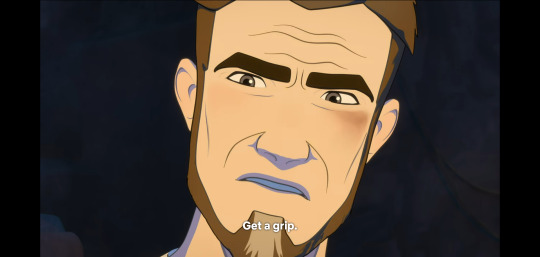
Pictured: Healthy coping mechanisms.
Part of what still distinguishes Viren's "I will do anything for my family; however dangerous, however vile" from Callum's developing "I would do anything for you" is that Viren is always deliberately addressing the "things that are so unforgivable, you will never forgive yourself" facet while Callum leaves it implicit because he doesn't really understand and/or want to acknowledge that yet (and also Rayla would probably twist his nose again, which fucking hurts). In how Viren describes it to Terry, he is using that up-front acknowledgement to then essentially abdicate any emotional responsibility for... well, anything at all. The entire "however dangerous, however vile" mantra is another way of denying his own agency, because if he'll do anything, then he doesn't actually have to go through the difficult emotional process of making those decisions and dealing with the aftermath.
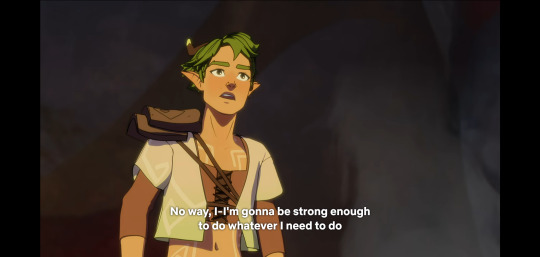

Pictured: H-healthy coping mechanisms?
Terry correctly pegs this questionable excuse for philosophy as "not having feelings," and generally not the best approach, because it will do things like lead to a default state of emotional unavailability to your children—oh, wait. I think it's not unlikely that Viren's emotional distancing from what "I will do anything for my family" meant contributed a lot to the degradation of it as his core value and his ensuing Arc 1 state. A lot of what's going on in his s5 dream is that he's being confronted with the consequences of "I will do anything for my family," specifically. He's being forced through an emotional speedrun of what it has cost him and everyone around him, and what has he got to show for it? Claudia, corrupted beyond recognition, proudly repeating his own words back to him.

Pictured: Whatever the opposite of daddy issues is.
Because the whole point of Viren's "I will do anything for my family" in Arc 2 is the challenge of whether he would/will do it all again. If he holds to that value the same way he did before, he'll do whatever it takes to save Claudia—however dangerous, however vile. Most of Viren's moral and emotional stuff has been based on his self-serving resignation to having "no choice." He's so tragically trapped in a chain of spiraling consequences he can never break... except oh wait, he totally can. S5 is all about Viren recognizing the dark magic feedback loop and that he has the agency to break it, and his best and only chance to avoid doing further harm to Claudia is to not be willing to destroy himself that way again, even it it means his death will cause her terrible emotional pain.
We'll see how that works out. Because let's be real: Claudia's gonna Claudia, regardless. However it goes, there's an important narrative precedent being set for both breaking free from dark magic/Aaravos and evaluating the "I will do anything for you" impulse in a more nuanced way.
53 notes
·
View notes
